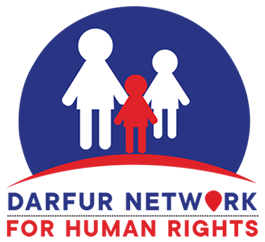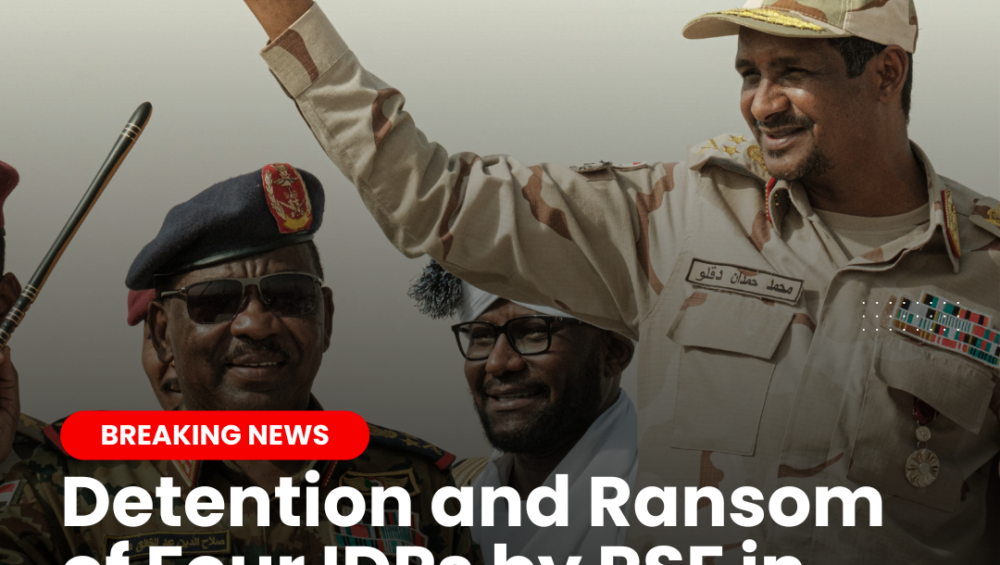On December 10, 2024, four individuals from Kalma IDP Camp in South Darfur were detained and assaulted by ten armed men affiliated with the Rapid Support Forces (RSF). The perpetrators, traveling on camels and a motorcycle, targeted the victims while they were working on a farm. Three of the victims were laborers, and one was the brother of the farm owner, all residing in Center 4B of Kalma Camp.
The incident took place on Tuesday morning, December 10, 2024, in the former Kandwa Forest, southwest of Kalma Camp, where the victims were engaged in farming activities. The armed men attacked them, brandishing firearms and physically assaulting them with whips and sticks before throwing them to the ground. The attackers accused the victims of stealing 21 goats from their herd.
Despite having no involvement in the theft, the victims were subjected to an organized extortion scheme. The perpetrators alleged that the stolen goats had entered the farm of Ishaq Mohamed Nour, a displaced person residing in Kalma Camp.
The abductees were forcibly taken to an RSF-controlled facility west of Kalma village, specifically a fuel warehouse, and were later transferred to a federal police station operated by the RSF in the Bilel locality.
Extortion and Ransom Demand
The RSF-affiliated perpetrators demanded a ransom of 2,685,000 Sudanese pounds (approximately two million six hundred and eighty-five thousand Sudanese pounds), citing compensation for the stolen goats and associated losses. They threatened the victims with torture and pledged to pawn them if the ransom was not paid. Additionally, the farm owner, Ishaq Mohamed Nour, was explicitly threatened with death if the payment was not made. A partial payment of 150,000 Sudanese pounds was made in cash, with the remaining balance due by December 25, 2024.
Broader Implications
This incident exemplifies a recurring pattern of extortion and exploitation by individuals affiliated with the RSF. Such acts highlight how IDPs in Darfur have become vulnerable targets for financial gain by armed groups at both individual and institutional levels.
The motives behind kidnappings and detentions in Kalma Camp reveal a complex interplay of economic and strategic incentives amid the ongoing conflict in Darfur. Key factors driving these acts include:
- Financing Armed Operations:
Armed groups, primarily the RSF and allied militias, exploit ransom payments to sustain their military activities. These funds are reportedly used for acquiring weapons, maintaining logistics, and other operational needs. - Opportunistic Exploitation by Smaller Factions:
In addition to organized groups, smaller militia factions and criminal networks take advantage of the lack of security and governance. They target vulnerable populations, including IDPs, to extract ransoms for personal or localized financial gain. - Personal Enrichment by Commanders:
Reports indicate that individual commanders involved in kidnappings often divert portions of ransom payments for personal enrichment. These funds are used to bolster their influence, reward loyal fighters, and consolidate power within the fragmented militia landscape. - Systemic Vulnerability:
The ongoing conflict has created a climate of lawlessness in IDP camps like Kalma. The absence of effective protection mechanisms and accountability has emboldened perpetrators to use violence and fear as tools to exploit displaced populations.
These actions not only reflect the dire humanitarian and security challenges faced by IDPs but also underscore the broader implications of prolonged conflict in Darfur. Targeted communities endure psychological trauma, loss of resources, and continued displacement, exacerbating their already precarious conditions.
Call to Action
The Darfur Network for Human Rights (DNHR) urges the following actions:
- International Intervention:
Immediate intervention by international humanitarian and human rights organizations to ensure the safety and protection of IDPs in Kalma Camp. - Accountability Measures:
Thorough investigations into RSF-affiliated abuses and holding perpetrators accountable under international law. - Support for Victims:
Provision of financial and legal support to the victims and their families. - Enhanced Monitoring:
Increased monitoring and documentation of human rights abuses in Darfur to prevent further exploitation.
The DNHR remains committed to advocating for the rights of IDPs and ensuring that such violations do not go unaddressed.

